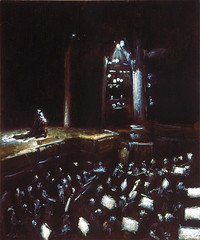The glorious music of Verdi needed no introduction, and the new production by David McVicar was as good as one could wish for, despite a couple questionable choices made by him or by the revival director Walter Sutcliffe. The production was influenced by the paintings of Francesco de Goya and the nocturnal images had perverse beauty just like those of the master.
The singing was glorious for the most part. I enjoyed the male singers very much, from the bass Burak Bilgili, who set the tone of the event as the captain Ferrando, to the magnificent Dmitri Hvorostovsky as the jealous Count di Luna, who competed with his unknown brother Manrico, the troubadour, sung by Marco Berti. Hvorostovsky was a known quantity and his dark and honeyed tone was deeply satisfying. Berti's singing was strong and virile, though one wished for more poetry than he provided. However, his timbre was beautiful and I was reminded a few times of the late Luciano Pavarotti. No small praise.
The women were even better. Both the soprano and mezzo-soprano were making their local stage debuts in this production. I have heard both good and, occasionally, mixed reviews of soprano Sondra Radvanovsky, who played the love interest Leonora in this production. Her scintillating, quick vibrato surprised me and disturbed me in an intoxicating way. More and more, I was drawn in by the incredible expressiveness of the voice and felt like there was some strange chemical reaction to her beautiful singing taking place in my body. Her silvery bell-like sound and the well-supported pianissimo were heavenly. Her voice worked like a magical elixir. It will drug you. Brava!
I had been waiting to hear Mezzo-soprano Stephanie Blythe, who sang the sad, confused, loving, and vengeful gypsy woman Azucena, for many years. I couldn't wait to be knocked over by her much lauded force-of-nature kind of voice. I also knew that she was a great artist and anticipated hearing more than simply strength. However, I was very surprised that what I heard did not resemble the 'miracle' I'd been led to expect.
In the first two acts, Blythe's phrasing seemed choppy, and her voice thinned out somewhat in the higher register, and sounded less than fully supported as well. Only the low notes clearly demonstrated the greatness I was expecting to hear. People did cheer her singing heartily, which baffled me. Since I'm no voice expert, I can only state that her singing in the first two acts failed to move me, and I was disappointed. After the intermission, her voice seemed be emanating from another throat - her high register was much more full, and well integrated with the lower ones. Despite the fact that her very top notes still sounded thin, her singing was close to the great fame that proceeded her. I wondered if she hadn't warmed up early enough, or it was an off-night fluke. However, others said that she repeated the magical performance given on the much praised opening night, so I guess that I'm in the minority.
New music director Nicola Luisotti led the orchestra with great care, but I didn't like all his tempo choices. When urgency was called for, his pacing resembled a stroll on the beach on a balmy night. By striving to create lyric beauty, he often let singers create the tension by singing alone, challenged by the leisurely pacing and insufficient support. If Donald Runnicles were conducting, the tension would have been truly explosive.
Even so, it was a glorious night, and one can still catch a performance in the coming days: September 22, 25, October 1, 4, 6 (October 1, 6 performances have alternative cast for Azucena and October 4, 6 performances for Count di Luna).






No comments:
Post a Comment